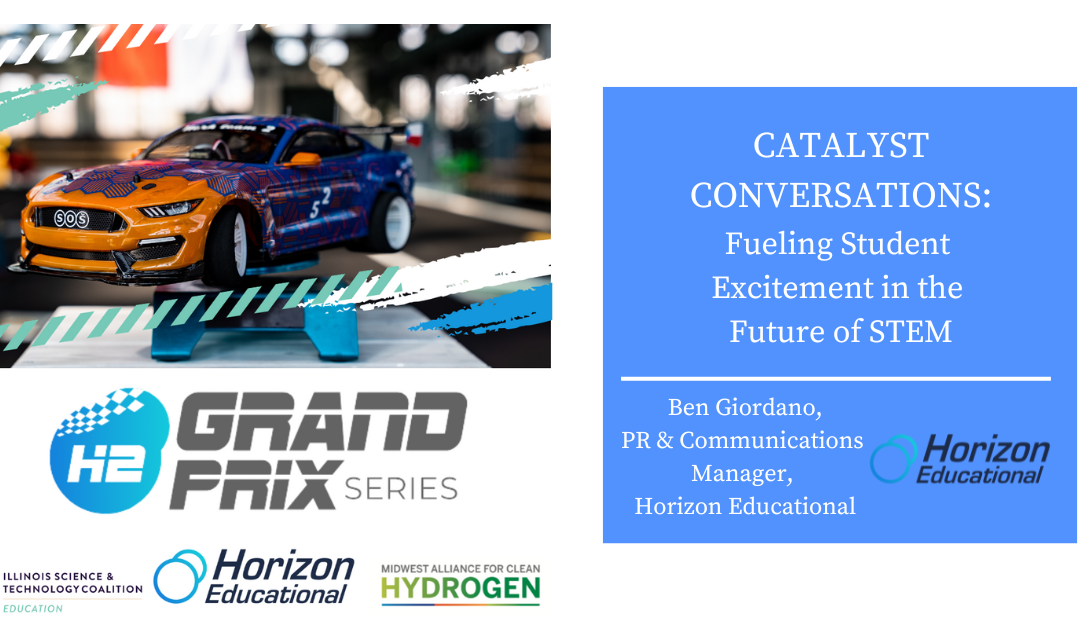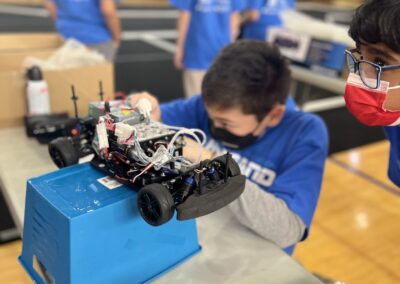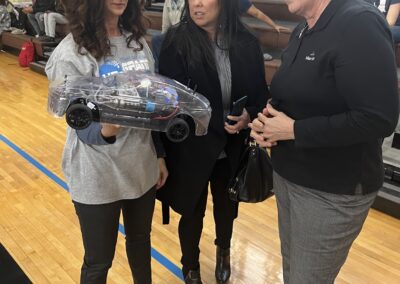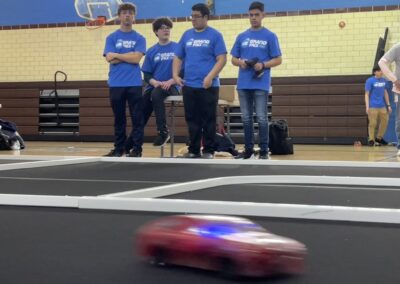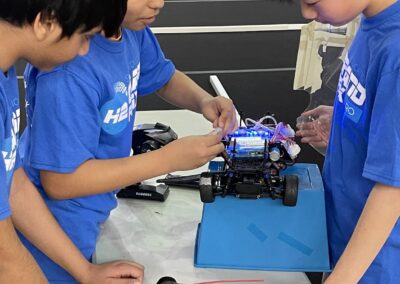CATALYST CONVERSATIONS: Fueling Student Excitement in the Future of STEM
ISTC’s Education programs are dedicated to providing STEM opportunities to students by getting them hands-on experiences to better introduce them and expose them to not only STEM pathways that will exist in the future, but these new and emerging industries, especially in the areas of climate science and climate curriculum. We’ve tracked the trends of what our students are excited to pursue, both on the Mentor Matching Engine and through the STEM Challenge program. We’ve seen student research moving towards a focus on sustainability – everything from fashion to the impact of environmental racism.
When ISTC Board Member Colleen Wright from Constellation Energy shared an opportunity for us to partner with Horizon Educational, we were quick to get involved. The H2GP PRO program provides high school students with a comprehensive understanding of the engineering principles behind the future renewable energy society. Students work in teams to design, engineer and build their own fuel cell-powered RC car and compete in a 4-hour race.
Ben Giordano is Horizon Educational’s PR and Communications Manager and shared with us the important impact of early exposure to these skills and how gamifying these experiences can help pique student interest in a future in these emerging industries.
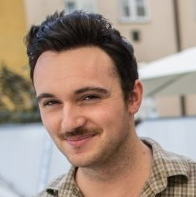
Ben Giordano, PR & Communications Manager, Horizon Educational
Can you give us a quick overview of what the Hydrogen Grand Prix Program entails.
In every geographic area, we have a qualifying race where kids can learn how to drive their hydrogen fuel cars and problem solve with their team before the final. Then we have a final four-hour endurance race where the kids get to get to drive their cars and see who can complete the most laps overall with the car they’ve built over like the previous six months.The winners in each final go on to compete in a world final. These kids fly from all over the world to compete and a lot of the time, it’s the first time leaving their country. They all meet in a host city, which is Las Vegas this year, and put their hydrogen and renewable energy skills to the test.
Talk to us about what an important milestone this is for Horizon Educational to be able to get this into Illinois and the Midwest?
We’re really excited to work with ISTC and organizations like Constellation and Nicor as a part of the Midwest Alliance for Clean Hydrogen, to bring our Horizon Grand Prix program to kids all over the Midwest. We’re really happy to be hosting these races right here in Illinois. We’ve been running this program for six years now and we’re currently doing it in over 20 countries. The growing demand for energy in an era of manmade climate change may ultimately be the greatest challenge of the 21st century. We need to continue to expand our programming geographically to develop a worldwide network of future leaders with creativity, ingenuity and critical thinking skills in order to tackle the world’s greatest challenges.
“ Seeing students’ eyes light up when they figure out how to construct their own hydrogen-powered car, you really get a sense of the importance of students taking ownership of their own learning.”
Why is it important to give students these experiences early on in their educational journey?
By providing these students with experiences in STEM education at an early age, we’re able to impact a child’s long-term education and career. Central to the H2GP program is hands-on learning, with students actively designing, engineering and constructing their hydrogen-powered car, before having to repair it during the race. This process of not only learning renewable energy engineering theory but applying this theory to real-world applications has been shown to improve students’ cognitive development, as well as keep them engaged in STEM classes throughout their school careers.
What is the end goal for programs like H2GP?
We created H2GP with one goal in mind: develop the next generation of renewable energy leaders, building a future workforce capable of tackling the engineering challenges associated with the climate crisis. All the investment and grants going into renewable energy infrastructure is important, but this needs to be accompanied by investment in people. Who will be the future battery designers, solar panel technicians and hydrogen fuel cell researchers 10 or 20 years from now? This is a problem that needs to be addressed urgently – and we’re here to do it. The goal of the program is therefore to build this future workforce that will be able to shape the future energy economy – addressing the shortage of renewable energy talent in the decades to come.
What have you learned over the past six years of bringing this program to students?
Over the past 6 years of bringing this program to students, we’ve learned that students enjoy learning by doing. Teaching the theory in lectures and classes is important, but to truly engage students they have to see how this works in the real world. Seeing their eyes light up when they figure out how to construct their own hydrogen-powered car, you really get a sense of the importance of students taking ownership of their own learning. As anyone who’s been to an H2GP race would tell you – the engagement, excitement and energy can be felt throughout the room. Channeling the excitement and energy from the races into positive and productive learning experiences is something we’re committed to as we expand into new regions like Australia and Singapore.

